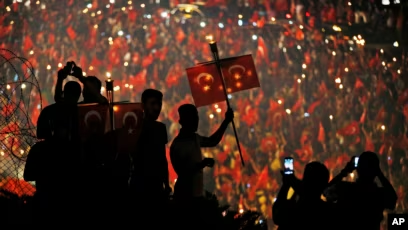My father was a Turk who migrated from the Caucasus to the east of Türkiye. My mother is the daughter of a Kurdish tribe from that region. So, I was born from the marriage of a Kurd and a Turk.
If you travel to southern Türkiye, you’ll see thousands of people born from marriages between Arabs and Turks. You can read the results of marriages with Georgians and Laz People in the north, and with Bosnians and Albanians in the west, on the faces of hundreds of different types of people.
Similar stories are told in Iraq, Iran, Syria, Lebanon, Jordan, Palestine, and Egypt. These lands are home to nations whose bloodlines and ancestries are intertwined. When our genetic history is examined, traces of dozens of races and nations are found each time.
Our children’s names are shared. Kurds, Turks, Persians, and Arabs give their children names from each other’s languages. One of my son’s names is in Turkish, one of my daughter’s is Persian, and the other’s is Arabic, for example.
Our songs are also shared. In Türkiye, many artists sing the songs of Fairuz, Umm Kulthum, and Şivan Perwer in Turkish. I don’t think there is a Kurd or Arab who doesn’t know İbrahim Tatlıses’ folk songs.
What I mean is, the geography we live in is a melting pot of nations bound together like flesh and nail. I believe whatever happened, happened in the last 150 years. We could not find peace after distant countries set their sights on our lands. They changed the history books and inserted information that denigrated the nations we were once related to, and we educated our children accordingly. Most of that information was the product of the dirty games of imperialist states. The strife that maligned the Arabs against the Turks and the Turks against the Kurds was finally successful, and they turned us all into enemies. Everyone started preaching the superiority of their own ethnicity and imposed it on others. What a sad and shameful story.
What is even sadder is this: We all believe in the religion of a Prophet who said, “A black-skinned person has no superiority over a white-skinned person,” and we are proud to be his followers.
I wonder, what would Prophet Muhammad (PBUH) say if we sat in front of him and told him about the greatness and superiority of our race and lineage?
Metaphorically, we all believe in the concept of the ummah, and I doubt anyone would object to what I’ve written. In fact, in the countries I’ve visited, I saw Arabs, Kurds, and Persians passionately supporting these ideas, reciting more verses and hadiths about Muslim brotherhood than I did.
And then do you know what happens? They always claim that it was others who broke this brotherhood, and then they exonerate themselves. So, no one sees anything wrong with themselves. So why can’t we form alliances?
Nowadays, many Muslims view unity, coexistence, and Muslim brotherhood as nothing more than romanticism. Saying, “It is impossible for us to come together,” they withdraw into themselves, define their borders with thick lines, and set to work to glorify their nation-state. Ultra-nationalism has become so bizarre that even within ethnic identities, debates like “the most authentic Arab,” “the truest Kurd,” and “the highest Turk” have started. That’s how racism eventually destroys itself.
We’ve been discussing these issues intensely in Türkiye lately. Because just recently, President Erdoğan gave an important speech about a Turkish-Kurdish-Arab alliance.
He said:
“When Turks, Kurds, and Arabs formed alliances, the winds from their horses spread cool breezes from the China Sea to the Adriatic. When Turks, Kurds, and Arabs are united, when they are one, together, then the Turk exists, the Kurd exists, the Arab exists. When they separate, divide, and grow distant, there is defeat, humiliation, sorrow. The Mongol armies ruthlessly destroyed Islamic lands, because Turks, Kurds, and Arabs were divided. The Crusaders attacked Islamic lands, because Turks, Kurds, and Arabs had drifted apart. We lost World War I, borders were drawn between us, walls were built. We lost Jerusalem because of division.”
Rhetorical or not, I don’t know of any other leader in the Islamic world emphasizing such partnership and alliance. Erdoğan’s remarks were rejected and criticized by certain groups in Türkiye. The critics were those who educated themselves with the coded readings of history that Western countries had coded, saying, “The Arabs stabbed us in the back, the Kurds tried to divide us.”
I’m sure if an Arab leader called for an alliance with Turks and Kurds, he would also be criticized by Arabs who were influenced by the same Western sources that say, “The Turks held Arabs back and tried to assimilate them.”
We have ingrained beliefs, emotional baggage, and misreadings of history. On top of all that, add the self-serving interests, roadmaps, and selfish attitudes of politicians who oppose alliances between nations.
If we begin to answer the question, “Why can’t we form alliances?” through self-criticism, we may find a solution. Otherwise, alliances cannot be built through selective readings of history, pointing out others’ faults, or glorifying ourselves. Self-criticism allows us to find common ground and helps us overcome divisions.
But I see that, because of rising popular nationalism, the children of that blessed Prophet now spend their time proclaiming the superiority of the white over the black. Reasonable people, however, silently observe the events. In that case, the arena becomes a hotbed for chauvinists, populists, and extremists.
We must speak up and bravely defend what is reasonable. Arab intellectuals must boldly say, “The Arab is not superior to the Turk.” Turkish intellectuals must write, speak, and show themselves by saying, “The Turk is not superior to the Kurd.”
Then, we will see alliances being formed in this region.


